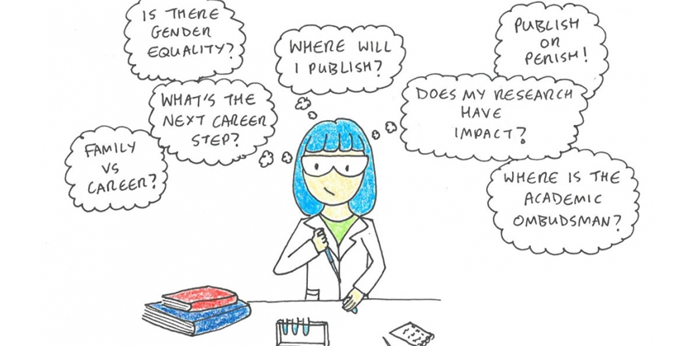Life after a PhD. What next?

Written by Charlotte Rouse
Having just submitted my PhD thesis, I have arrived at a point of major change in my life as I prepare to embark on my first professional position. It is a time filled with uncertainty and trepidation, but also excitement as important decisions are being made that will shape the future of my scientific career.
By sharing my personal academic journey, I hope that I can offer some words of encouragement to those approaching a similar stage. I also recently had my views on this topic published in BioPhysical Reviews with the intention of giving current academics, whose own experiences post-PhD may have been quite different (and for some quite distant!), an insight into some of the challenges that young people face.
I started my undergraduate studies in Chemistry at Newcastle University in the U.K. in 2005. I had a lot of fun during my degree (Newcastle is a fantastic city to be a student in), but I also worked very hard and had a real interest in my studies.
Despite developing an interest in research, I did not feel ready to commit to a PhD immediately after graduation and didn’t really have any idea of what I wanted for a career. Because of this indecision, I was woefully underprepared for life after University and spent the next year or so dithering around in various non-scientific positions. After doing some serious saving I booked a one-way flight to Brazil and spent a year backpacking solo around South America. I saw some amazing places, met incredible people from all around the world, learnt some Spanish and even learnt a bit about myself.
For the entire twelve months, the only nod to ‘real life’ was my application for a PhD. scholarship. At first, looking at all the Universities and research institutions all over the world was completely overwhelming, but thanks to my undergraduate research experience I at least knew the area that I wanted to study. After much Googling I opted for ANU. It had a group doing the type of research that I wanted to work in, great facilities, a large multi-disciplined department and was in Australia, a country I’d never been to before and was keen to explore!
Anyone who has done a Ph.D. will tell you that it is a long, difficult journey but it can also be a time of great freedom. Even if you chose to stay in academic research afterwards, there will never be another time that you will have such liberty to pursue your own interests and I had a supervisor that allowed me that free reign over my own project. As a result, my Ph.D. research was very multi-disciplinary, covering chemistry, biochemistry and biophysical chemistry—reflecting my desire to continually learn. You may think that staying in research would be a no-brainer, but a few things have held me back from taking the next step in an academic career and accepting a post-doc position.
Research is a highly competitive career path and the measuring stick for success is publications. Although there isn’t really an alternative for differentiating between candidates for job positions or funding, I would like to see less emphasis on the number of authorships, the impact factor of journals and citation numbers, and more on the science itself.
There is also very little stability attached to any academic position and it is an expectation that you will probably move yourself, and your family, across the globe several times during your working life. It is still considered much more usual for a male partner to instigate this type of life decision than a female.
Although gender equality has made great progress, I think we are entering a new phase of modern equality, where it is not enough to consider fairness in terms of the number of women in science and high-ranking positions, but also how work life creates different pressure on personal life for the different genders. Australia is quite progressive in this respect, and the SAGE initiative creates some excellent opportunities for women in science, but this is not the case world-wide.
I’m now working in a government position in the renewable energy sector, something which I’d never really aimed for but which I absolutely adore. I’m still connected with research projects, fuelling my desire to learn, but I’m also involved in their practical application to real-world problems. So even though I’ve taken the scenic route, taking about ten years and 15,000 km to realise what I wanted, I’ve finally arrived at the beginning of what I hope will be an exciting and rewarding career.
http://science.anu.edu.au/news-events/student-blog/life-after-phd-what-next
